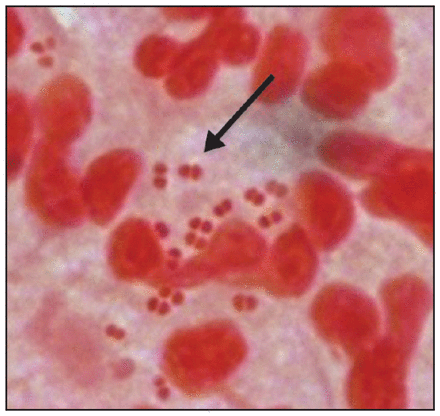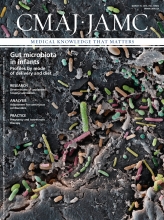Infant microbiome characterized
Compared with breastfed infants, formula-fed infants had increased richness of microbiological species and overrepresentation of Clostridium difficile. Infants born by elective cesarean delivery had low bacterial richness and diversity. Azad and colleagues used high-throughput sequencing to characterize the composition of gut microbiota in fecal samples from 24 healthy infants and describe the influence of mode of delivery and diet at 4 months. These results will help advance our understanding of the human microbiome and its potential role in health and disease, say the authors. See Research, page 385

Image courtesy of © 2013 Thinkstock
Changes in the developing gut microbiota of infants have been associated with breastfeeding, cesarean delivery and antibiotic use. Because these changes may affect health outcomes later in life, pregnant women and their medical professionals should be aware of these issues when planning neonatal care. See Commentary, page 373
Breastfeeding unfriendly in Canada?

Image courtesy of © 2013 Thinkstock
Although some 90% of Canadian women start out breastfeeding their babies, only 14% are still breastfeeding exclusively after 6 months. According to Chalmers, an overarching reason for this is the lack of instruction for health care workers. Other problems include the lack of comprehensive studies on breastfeeding, the lack of monitoring in hospital and the poor quality of information given to mothers. See Commentary, page 375
Blood type and thromboembolism risk

Image courtesy of © 2013 Thinkstock
In a first-contact medical practice, encountering patients with thromboembolic disease who have no apparent underlying risk for the condition is common. Using 2 very similar population-based cohorts from Copenhagen, Sade and colleagues report that non-O ABO blood type confers increased risk of thromboembolism, accounting for about 20% of the population burden. This risk adds to the known risk of 2 prevalent mutations: factor V Leiden R506Q and prothrombin G20210A. See Research, page E229
Unplanned admissions to hospital
We already know that people with chronic physical conditions are more likely to have unplanned and preventable admissions to hospital. In this paper from Scotland, Payne and colleagues show that there is a dose–response effect relation with the number of conditions and that the effect is amplified if 1 or more mental disorders or social deprivation is also present. See Research, page E221
Top achievements in health research 2012
In the fourth Canadian Institutes of Health Research/CMAJ competition acknowledging top achievements in health research, 5 winners were chosen by an international review committee. Synopses of the winning achievements are highlighted in this article. See Special Report, page 397
Adjustment for continuous confounders
Adjustment for confounding is important in observational studies, and incorrect modelling of a continuous confounder can leave important residual confounding. Groenwold and colleagues review the current reporting practice in several journals, find it is suboptimal and make suggestions for improvement. See Analysis, page 401
Pregnancy and isotretinoin
Despite isotretinoin being a known potent human teratogen, fetal exposure to this drug still occurs. The authors outline the common causes of exposure in pregnancy and current programs to prevent exposure. They caution that a 1-month window after the end of therapy prior to conception may be inadequate. See Practice, page 411
Urethral discharge

A 34-year-old man who has sex with men was given oral ciprofloxacin for documented gonococcal infection. His urethral discharge and painful urination did not improve with treatment. What is causing his persistent symptoms? How should this be treated? Rebick and colleagues address these and other questions in the care of this patient. See Practice, page 414











